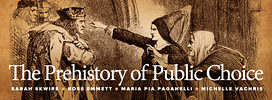While it is true that a stripped down analysis based exclusively on rational self-interest gives us a clear and rigorous understanding of incentives, it comes at the cost of potentially creating a caricature of human beings. One of the advantages of looking at literature to integrate public choice analysis is that there we find descriptions of human beings that are more realistic than the homo economicus generally used in modern public choice models.
The bifurcations between the individual and the social and between the political and the economic, mentioned in all the essays this month, create parallel worlds in which the public spirit is segregated into the political sphere and self-interest into the economic sphere. This generates an idyllic image of the political but also a despicable image of the economic. While politicians care dispassionately about the world, economic agents are heartless calculators.
What novels help us see is that that bifurcation is artificial and potentially limiting. Characters in novels, whether they are politicians or economic agents, are generally complex individuals. Many of public choice theory’s agents are not. They are simply rational calculators, perfectly sealed into an emotion- and ethics-proof world. But these theoretical agents behave in inexplicable ways when compared to real people in real or in experimental settings. With a Tullock-like approach, one remains impotent in front of experimental results that show, consistently and robustly, levels of cooperation that cannot be predicted or explained by traditional models. This is because such models slice off a part of human behavior and ignore the rest of the human being.
What Scottish Enlightenment thinkers such as Adam Smith may teach us is what Richard Wagner, one of the most important public choice scholars alive today, and Vernon Smith, a recipient of the Nobel Prize in economics, are also teaching us: humans are complex social beings whose conduct should be seen as embedded in an institutional and moral context, not in isolation from it.
Richard Wagner started a research project to study what he calls Entangled Political Economy. To better understand the political and the economic we should not separate them and make them into independent islands, but recognize their entanglement. Similarly Vernon Smith, puzzled by the systematic difference between rational predictions and experimental results, has increasingly made use of Adam Smith’s Theory of Moral Sentiments to explain the results from his laboratory. Monetary or material incentives are only a part of our motivational structure. We also care about fairness, about doing the right thing, about being “praiseworthy” and not “blameworthy,” to use Adam Smith’s expressions. Both Wagner and Vernon Smith are trying to re-integrate some of the different parts of human beings which have been separated in post-Enlightenment economics.
Novelists, pre-and post-Enlightenment, have the advantage of not having to try to un-learn and re-learn how to understand incentives and human conduct, because for them the individual and the social, the political and the economic, reason and the passions, sentiments and interests, are still entangled together forming complex social beings.
Literature, the Scottish Enlightenment, Adam Smith, James Buchanan, Richard Wagner, and Vernon Smith are all reminding us, even if in different ways, that we are individuals, but that we are also social beings. As social beings we live in a social context in which incentives and institutions matter, but also where the judgment of our “impartial spectator,” or the voice of the “man within,” matter as well. Rational choice analysis, like public choice, is indispensable, but it should be complemented by (and not substituted for) an analysis that takes into consideration our moral incentives. Politicians, like shoe shoppers, are motivated and constrained by both their self-love and their desire to be approved of by others.

